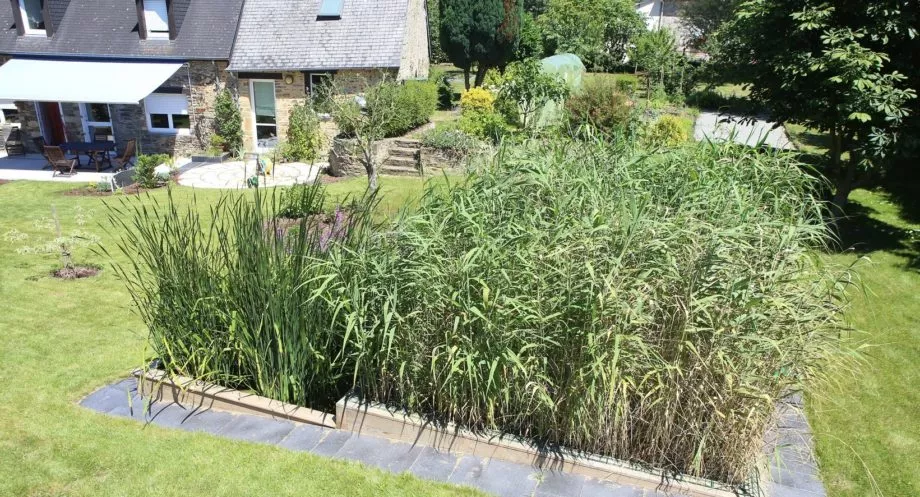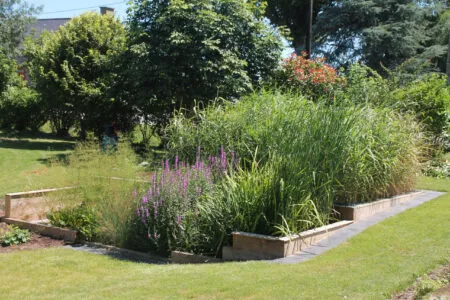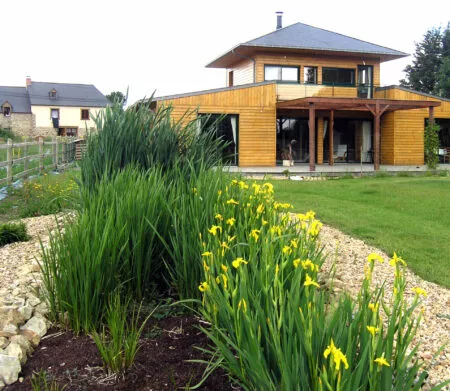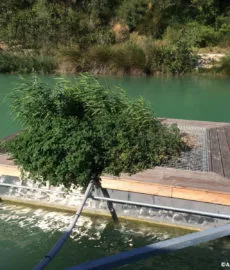Wastewater treatment
Before household wastewater is discharged into the environment, it must be purified to remove pollutants. This operation is carried out with sanitation devices. At Aquatiris, we offer innovative and ecological solutions based on phyto-purification for efficient wastewater management. Whether for individual homes, grouped housing or tourist or agricultural infrastructures, our systems guarantee optimal treatment of effluents.
Wastewater sanitation techniques
Wastewater sanitation offers significant advantages for the preservation of the environment and public health. Whether for the management of black water (from toilets) or grey water (from the kitchen, washing machine, dishwasher, shower), trust Aquatiris to find an innovative and sustainable solution. Our phyto-purification systems offer an ecological and aesthetic alternative to traditional systems.
Collective sanitation
Collective sanitation is achieved by connecting a wastewater drainage network to a purification station. This system is compulsory for housing in urban areas or in municipalities with a public collection network. Once the wastewater has been collected, it is treated in several stages to eliminate bacteria before being discharged into the natural environment.
The process can be carried out using a joint network which combines domestic liquid wastewater and rainwater in the same pipe. The treatment requires the use of a control system to manage flow variations. The separative network, on the other hand, separates sewage from rainwater in order to optimise the operation.
Non-collective sanitation
Non-collective sanitation (NCS) or individual sanitation concerns homes that cannot be connected to the public network. Each owner must therefore opt for an effective treatment system to eliminate pollutants from wastewater before it is discharged onto the plot. If you find yourself in this situation, an Aquatiris device will meet your expectations.
The all-water septic tank is a common system that pre-treats liquid wastewater by retaining solids and grease before they pass through a filtration system. Several households also use the compact filter. Micro-stations, on the other hand, offer biological treatment thanks to the action of micro-organisms.
Ecological sanitation
Ecological sanitation is based on natural systems that use the purifying properties of plants and micro-organisms to treat wastewater. Phyto-purification is an innovative solution that allows water to be decontaminated without a tank or drain. This technique is a reproduction of the natural purification processes observed in wetlands.
The technologies used include planted filters which combine physical filtration and biological purification. This promotes the development of the bacteria responsible for breaking down pollutants.
At Aquatiris, we assist individuals and professionals in installing ecological sanitation systems tailored to their needs and in compliance with current regulations. Request a personalised quote today to optimise the sanitation of liquid wastewater in your home.

Products offered by Aquatiris for wastewater treatment
Wastewater treatment is a major issue in preserving the environment. At Aquatiris, we have developed environmentally responsible systems based on phyto-purification to meet various needs.

PhytoTiny
The PhytoTiny, developed by Aquatiris, meets the demanding needs of mobile and unusual accommodation (cabins, caravans, yurts). This device incorporates a compact and efficient phyto-purification system. It works using a natural filter composed of purifying plants. It is therefore an ecological wastewater treatment system without the use of a septic tank.
Different models of the PhytoTiny are available depending on the use and constraints of the home:
- fixed system for household water,
- mobile version to accompany travelling accommodation,
- all-water configuration including an additional plant box.
This individual sanitation system integrates perfectly into the environment, while offering optimal autonomy and limited maintenance.

Sanitation Garden
Traditional wastewater treatment systems often have limitations in terms of ecology and sustainability. The Sanitation Garden that we offer is an innovative solution based on phyto-purification. It replaces septic tanks by using natural filters made up of plants such as reeds to purify the water. This non-emptying system is perfectly suited to individual houses, grouped housing, holiday cottages and farms.
Thanks to its natural filtration principle, the Sanitation Garden breaks down solid matter directly in the open air. This avoids the nuisances associated with odours, sludge and frequent emptying.

PhytoCompact
PhytoCompacts are an excellent alternative to traditional wastewater disposal systems as they are much less harmful to the environment. This system consists of a wood chip pre-filter that retains and treats solid pollution in a way comparable to composting, and a plant filter that provides biological filtration through purifying biomass associated with the substrate and plant roots. PhytoCompact is the most compact Aquatiris sanitation solution and does not release wastewater into the open air.

PhytoIsland
In floating dwellings (barges, houses on the water), wastewater must be treated in a specific way. The Aquatiris PhytoIsland has many advantages for these environments. This ecological solution is based on a phyto-purification process using a substrate composed of reeds and aggregates (gravel, grit and sand) to filter the wastewater and eliminate pollutants. This modular system can be adapted to different types of floating habitations, whether it be a permanent residence, tourist accommodation or a port.
The PhytoIsland is designed to return purified water to the natural environment, without the use of chemicals or emptying of tanks. It can be installed under the floating dwelling, annexed to it or fitted under a vegetated terrace. It is therefore a flexible and aesthetic solution.

